Horace George Brinsmead
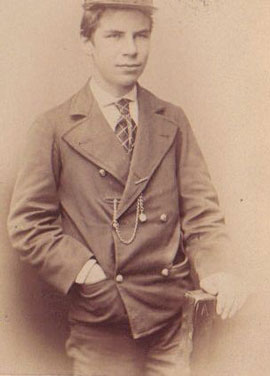 Horace George Brinsmead as a young man.
Horace George Brinsmead as a young man.Horace George Brinsmead split his life between England and Australia. He is the reason there is a Brinsmead, Australia on the map, just outside Cairns in the north of Queensland.
Horace George Brinsmead was the eighth and youngest child of John Brinsmead, the piano maker, and his wife Susan Brown. He was born on June 4th, 1854 in St. Pancras, London. Upon leaving school, in 1871, Horace joined the merchant navy and went to sea.
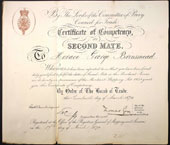 He worked
as an apprentice on the 1120 ton vessel The Hawkesbury.
It sailed from London to Sydney, Australia on March 5th,
1871. On March 23, 1872, while the ship as docked in Sydney Harbour, young Horace went AWOL and the Water Police Magistrate ordered that, as a deserter, he be ordered back on board ship. He attained his Second Mate's Certificate (right) in March, 1874.
However, at his parent's request, he returned to England and joined with his father and brothers learning all aspects of piano making at the bench.
He worked
as an apprentice on the 1120 ton vessel The Hawkesbury.
It sailed from London to Sydney, Australia on March 5th,
1871. On March 23, 1872, while the ship as docked in Sydney Harbour, young Horace went AWOL and the Water Police Magistrate ordered that, as a deserter, he be ordered back on board ship. He attained his Second Mate's Certificate (right) in March, 1874.
However, at his parent's request, he returned to England and joined with his father and brothers learning all aspects of piano making at the bench.
In 1876, Horace George represented the John Brinsmead piano firm at the Philadelphia Centennial Exhibition, this being the first occasion on which the firm obtained a First Award at an International Exhibition. His trip to the United States of America inspired him to introduce American ideas into the manufacture of pianos and up-to-date methods of advertising. He suggested to Edgar that the firm begin advertising under the Brinsmead name and this began in 1877.
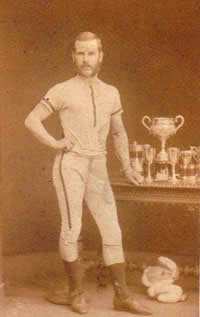 Horace George Brinsmead - English Middle Weight Boxing Champion, 1879.
Horace George Brinsmead - English Middle Weight Boxing Champion, 1879.
Champion Amateur Boxer
Horace George Brinsmead was an accomplished amateur boxer. In 1879 he won the British Middleweight championship. He continued boxing once he was living in Australia. In Sydney, an England vs. Australia match was arranged for July 30th, 1885, with Brinsmead fighting George Seal, the best boxer in New South Wales. It appears however that the fight may have been called off or at least postponed. Horace was described as "one of the most scientific boxers of the present day". Horace was active in boxing circles in Sydney and in Queensland, as a coach and referee. He maintained his interest in boxing throughout his life; in 1899 he wrote to the Brisbane Courier-Mail, attributing what he viewed as the degeneracy of English boxing to the betting fraternity.
1880 and The International Exhibitions
In 1879-1880, Horace George Brinsmead sailed to Australia to represent the John Brinsmead and Sons piano firm in the great International Exhibitions; Sydney in 1879-1880 and Melbourne 1880-1881. He took up residence in Australia and acted as the agent for the London firm in its colonial dealings.
A fascinating insight into Horace Brinsmead the man, and into the colonial business of the John Brinsmead and Sons firm, can be gleaned from a daily diary Horace kept between January 1st and September 3rd, 1880. The original is kept in the State Library of New South Wales, in Sydney, Australia. It details the intense lobbying for medals, for publicity and for other recognition from the exhibition. It also documents the somewhat frenetic pace at which he traveled to all the major centres in Australia as well as New Zealand, promoting the firm's business and taking orders.
A book on the Sydney Exhibition reported that:
In musical instruments, Messrs. John Brinsmead and Son's grand pianos obtained a first and special award for improvement in action; and their upright pianos gained a first place. Madame Summerhayes performed on Messrs. Brinsmead's instruments almost daily, and her recitals were attended by large audiences.
As Horace traveled around Australia and New Zealand promoting the piano business he made many business contacts. We know he entered into various relationships in relation to the piano trade. He also developed an interest in developments in Northern Queensland, arranging to have selections of land made in his name as early as 1881. His Cairns and district years are described below.
Financial Difficulties
Horace's frenetic pace of travel, and the business people he dealt with in relation to the piano trade, appear to have caused him serious financial difficulties in the 1880's. Some clues to the nature and cause of these difficulties can be found in the law reports. In 1887 the New South Wales Court of Appeal heard an appeal in a libel action; Mann v. Smith. It describes how, between October 1883 and August 1886, a Mr. Mann, using his wife's family's substantial resources, went into partnership with Horace Brinsmead in the piano import business. This was the time when he was pursing his interests in the Cairns area. Horace was at the time acting as the Australian agent for the John Brinsmead and Company firm in London. The Mann and Horace Brinsmead partnership got into financial difficulty the implication from the case is that this was partly due to malfeasance by Mann. The partnership owed the John Brinsmead firm an lot of money, and Mann faced bankruptcy. Horace engaged a man named Smith, at the London firm's request, to try to persuade Mrs. Mann's family to cover Mann's debts, apparently to spare him the embarrassment that could follow. This had the opposite effect and led Mann to sue Smith for libel.
Horace George must have also been harmed by these events since, on March 25th, 1886, while living in Sydney, he shows up in the insolvency files. Despite the optimism over his ventures in Cairns, by May of 1887, Horace George was officially bankrupt. A first meeting of creditors of Horace George Brinsmead, Planter, was held in Brisbane on June 9th.
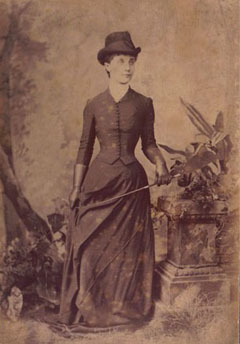 Alice Maud Mary Lanham.
Alice Maud Mary Lanham.
Marriage to Alice Lanham
Returning to his personal life, on Christmas Eve, 1885, in Sydney, Australia, Horace George married Alice Maud Mary Lanham. She was 22 years old and he was 31. The daughter of John Lanham and Ann Stevens, Alice was born in Newington, Surrey, England and baptized in the parish church of St. Mary's on June 7th, 1863.
The couple went on to have seven children; the first four born in Australia and the last three born in England.
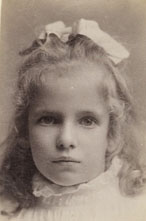
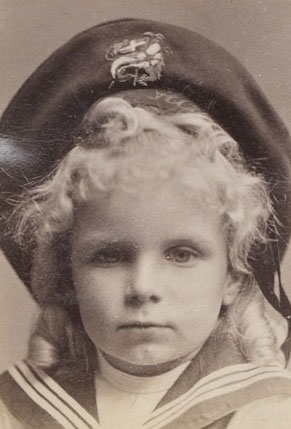 The two eldest children; Anne Emily and Maximilian George.
The two eldest children; Anne Emily and Maximilian George.
On February 7th, 1887, Horace and Alice had their first child, Anne Emily who, according the the Cairns Post of February 17th, was born at Virginia Plantation, Freshwater, Cairns. Over 90 years later, your editor had the pleasure of meeting her during a supper held by Morris and Barbara Latey in London. Her mind was still sharp and she expressed fond memories of living in Australia. She recalled, as a child, having played the piano for the late Nellie Melba.
The couple's second child, Maximilian George, was born in Glebe, Sydney, New South Wales on February 21st, 1890. Cecil Horace was born next, on July 10th, 1893 in Sydney. Noel John was born on December 15th, 1895 in Waverley, New South Wales.
Plantations in Northern Queensland
Horace George Brinsmead was an early settler in the area of Cairns, on the North-East Coast of Queensland, now one of the key towns around the Great Barrier Reef. Brinsmead Gap, a topological feature was named after him, as was the town of Brinsmead, a suburb of Cairns.
In 1881, Archibald Meston, an agent, settled a large section of very good land on Horace's behalf which became known as the "Virginia Plantation". At the time the area was experiencing a boom in its sugar cane industry. Horace partnered with two other southerners; a P.J. Royle and a P.P. Samuel, to undertake a sugar refining operation on the Freshwater Estate with its own mill. These plans went awry when anti-Kanaka legislation was threatened which would have restricted the ability to use immigrant labour from the Pacific Islands. Notwithstanding the ups and downs of the local economy, Horace George settled into the community and tried a variety of ventures. He was also active the the development of local government in the area. One of the other local notables was Richard Ash Kingsford, who became the first Mayor of Cairns, and is the maternal grandfather of Charles Edward Kingsford-Smith, the famous Australian aviator and close associate of Horace Charles' nephew Horace Clowes Brinsmead.
Dorothy Jones' book, Trinity Phoenix, A History of the Cairns District, observes, at p. 155:
Samuel and Royale were to all intents and purposes absentee landlords who visited their estates from time to time to inspect progress. Horace Brinsmead was a permanent settler who worked his own property which he called Virginia Plantation. There seems a belief current in Cairns that Brinsmead too was an absentee landlord, which is a grave injustice to a very prominent and long-standing resident who was much involved in civic affairs and served on the Divisional Board and most Associations with distinction. If Cairns should need a father designate, then it is surely Horace Brinsmead as it was he who formulated and moved the motion that the municipality of Cairns be formed.
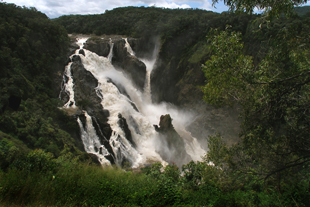 Barron Falls, near Cairns, Queensland.
Barron Falls, near Cairns, Queensland.It was in December, 1884 that Horace, a member of the Progress Association, initiated a petition for the separation of the Town of Cairns from the local district, making it a separate entity.
While Horace started out producing Sugar Kane, in 1884 he was also trying his hand at tobacco, the first in the area to do so. He invested in an hydraulic press to process the crop. In 1889 he initiated the Cairns Tobacco Company and Tropical Agriculture Co. Ltd. which was to lease the Virginia Plantation and produce rice and Tobacco. It did not, however, prove profitable. At one point, Horace also planted citrus orchards on his land.
Horace was an active promoter of local sporting and adventure activities. He was one of the founders of the Cairns District Jocky Club. An article in the Cairns Post of January 29th, 1885 reported that:
A large party of gentlemen accompanied Mr. H. Brinsmead on a visit to the Barron Falls on Tuesday last. This trip is now becoming quite a fashionable resort for pleasure parties. There can be no doubt the "falls" will during a year or so, become on of the "great tours" from Cairns. We venture to say this is one of the grandest sights to be seen in these colonies and the tourist would be well repaid even if a journey of several weeks had to be made instead of two days which it takes at the present time. The Cairns-Herberfon railway, when constructed, will enable the trip to be made in less than one hour from Cairns.
This trip to Barron Falls, a two day affair, became something of a local attraction, later publicized internationally by the "irrepressible" (which probably meant egotistical and erasable) Archie Meston, Brinsmead's early associate in the area.
In July of 1886 Alderman Kingsford of Cairns resigned from office, and a petition was raised asking Horace to take his place. He replied, in a newspaper announcement by saying: "Gentlemen: I have much pleasure in acceding to your request to become a candidate in the forthcoming election, and shall, in the event of being returned, do my best to merit the confidence you have reposed in me, and to advance the interests of the Municipality." He was duly elected on Friday July 23rd, 1886. He ran again in the election the next year and was once again returned with the second highest number of aldermanic votes.
The economy of the Cairns area, aways vulnerable and volatile in the early days, suffered a major depression in 1893. Following an election, new efforts were taken to reinvigorate the sugar industry. Plans were made for a new Barron Central mill under the Freshwater Sugar Company, with Horace Brinsmead very much to the fore. When he returned from a trip to England in 1895, Horace announced that he was once again going to put his land under sugar cane.
The Hobart Exhibition
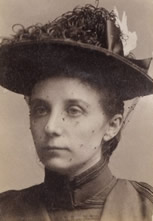
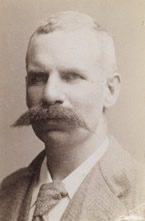 Horace and Alice Brinsmead at the time of the 1894 Hobart Exhibition.
Horace and Alice Brinsmead at the time of the 1894 Hobart Exhibition.
Despite devoting much time to his Cairns and area interests, Horace George was still involved with the piano trade. In late 1894, Tasmania put on a major International Exhibition in Hobart. Horace George arranged for one of the best spots on the site to be "The Brinsmead Rotunda" which hosted concerts and recitals and featured a wide range of the firm's pianos. He also secured very flattering press coverage for the firm which had a depot in Hobart.
In 1895, Horace returned to Cairns, as reported in the local newspaper:
The many friends of Mr. Horace Brinsmead will be glad to hear that he returned to Cairns late Thursday by the Cintra. As one of the original settlers at Freshwater, and holding so much of the choicest land in that locality, it is to be hoped that Mr. Brinsmead's return will open the way for some arrangement for the utilization of those splendid lands for sugar-growing. As a resident land owner he will, no doubt, see how readily his property can be made revenue producing.
On March 30th, 1897, Horace and son George left England on the Star of New Zealand, destined for Sydney. In January, 1898 he was reported by the Sydney Morning Herald to be taking a well deserved holiday tour to Hobart and New Zealand.
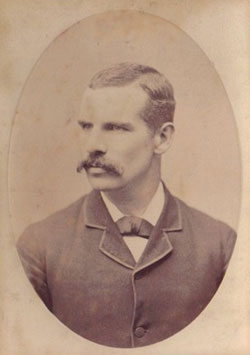 Horace George Brinsmead.
Horace George Brinsmead.Return to England
In 1898, Horace and his family planned a return to England. At his father's request, he agreed to enter into the partnership again, taking one third of the business, as equal partners with his two brothers and with the intention that John would then retire. This coincided with a time of turmoil at the firm. Lawsuits were pending and the firm was transformed into a limited corporation. Horace's older brother Tom was in increasingly poor health and his doctor was advising him to take time off work. Brother Edgar's blindness was getting worse. Horace was made Managing Director. According to Alistair Laurence, Five London Piano Makers he:
...immediately began a thorough modernization of the firm's fleet of instruments. In the course of one year, he introduced no fewer than ten new models, a remarkable achievement, which included a variety of overstrung grands of the most up-to-date design, ranging in size from a "baby" to a full-sized concert model.
Horace made a tour of the colonies to firm up agents and otherwise attend to the export business. While he was away, changes were made to the management of the firm. In particular, one of his nephews, Sister Rosa's son Henry Billinghurst, had been installed as the firm's Managing Director. Horace found the new management disagreeable and relationships deteriorated. Tom left the family firm and went to work with his wife's family firm of J & J Goddard. A board of directors meeting was called with a view of ousting Horace George from the firm, but in November 1903 he resigned instead.
Horace George then went into business on his own account using the name Horace G Brinsmead. He set up an office and perhaps a factory in Great Marlborough Street, and began manufacturing pianos. He sought to take advantage of his colonial connections, but ran into resistance from the John Brinsmead firm, who at home and abroad suggested he was not making genuine Brinsmead pianos. Indeed, there was some suggestion that he was simply buying inferior pianos and shipping them out under his own (albeit Brinsmead) name.
Once back in England Alice and Horace had three more children; Eric Sydney, born in Blackheath, Woolwich on January 14th, 1900, Una Pines, born in Hampstead on April 30th, 1905 and Denis, also born in Hampstead on February 10th, 1907.
Trips Back to Australia
After the family settled back in England, Horace George went back to Australia a couple of times for visits. He and Alice had good friends from their times there and kept in touch. In particular Horace and Alice maintained a close friendship with Frederick and Eleanor Pines of Sydney. On January 31st, 1902, they attended at the baptism of the Pines' daughter, in the role of Godparents, as she was christened Nance Brinsmead Pines. Horace and Alice reciprocated in 1905 when the christened their daughter Una "Una Pines Brinsmead".
An article in the local newspaper in Cairns, Queensland, on August 8th, 1905 advised:
AN OLD CAIRNS IDENTITY
Mr. Brinsmead, who for some time lived in Freshwater, paid a short visit to Cairns this week and renewed acquaintance with a number of his old Cairns friends. He leaves by the Wyandra this evening for the South.
We know that Horace traveled around Australia during this period promoting his own piano business. In May of 1906, Horace sailed from Fremantle, Western Australia to return to London aboard the Damascus. This appears to have been his last trip abroad.
Tragic Death
Horace Brinsmead suffered a stroke. On July 21st, 1908, facing illness and new financial problems, Horace George Brinsmead took his own life. The following article, from the Advertiser, of Adelaide, South Australia, provides the fullest account of Horace's death.
SHOT THROUGH THE HEART
Under tragic circumstances last month the son of the famous pianoforte maker, Horace G. Brinsmead, aged 54, was found to have committed suicide in his office at his business premises at the Hanway Street Works, Hanway Street, London. The discovery was made by one of the deceased 's clerks who, on returning from luncheon, found his master seated in a chair with his head thrown back, dead. In his hand was still clasped a revolver with one chamber discharged. Constable Gribble was called and he summoned Dr. Lewis, divisional surgeon of police from Tottenham Court road. The deceased had shot himself through the heart, the bullet having passed right through the body.
Mr. Brinsmead had not been in good health since an attack of influenza last Christmas, but nothing unusual was noticed in his manner when he left home at Hampstead in the morning. He was a son of the late Mr. John Brinsmead, the founder of the well known firm of pianoforte manufacturers. After himself representing that firm for many years, both in London and the colonies, the deceased severed his connection with it seven years ago, since when he has been in business for himself.
Mr. Brinsmead was in Adelaide a few years ago.
Horace George left a note to his wife saying that he was expecting trouble in the near future. He was in poor financial shape when he died, leaving an estate of only £188 18/- and creditors pressing to be paid. While each of his siblings had received an equal share of his parents' estates, his portion was directed to be held in trust and only allocated to him on a discretionary basis.
The Family After Horace's Death
In 1911, Horace George's widow Alice was living at 4 Wilton Road, Muswell Hill, London with three children still at home; Max, age 21, single and working as a bookkeeper, Una, aged 5 and Denis, aged 4. Son Eric was away at boarding school. Alice is reported as working as a clerk. Alice died in Wembley in 1950.
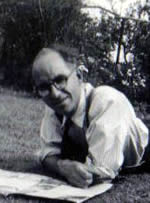 Denis Brinsmead
Denis Brinsmead
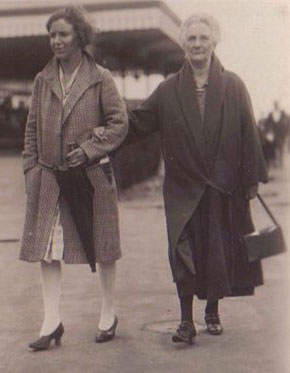 Una and Alice Brinsmead
Una and Alice Brinsmead
Anne Emily Brinsmead went on, in 1912 to marry William Lash Latey. The story of the Latey family will be detailed on another page on this site. Maximilian George followed in his father's footsteps and became a planter. He married Doris Ella. There is a record of their returning to London from Sumartra in 1936. He died in England in 1969. Cecil Henry was killed in 1916 at Gallipoli, in Turkey in World War I. Noel John migrated to Canada in 1912 as part of a group of "Home Children". He also fought in World War I, signing up a second time after suffering serious injuries. He returned from Canada to England and married in later life. His story is documented on one of the Canadian pages. Eric Sydney went into the merchant marines and qualified as a second mate in 1921. He appears to have lived at his mother's house when he was not at sea. In 1932 he married Elsie Beryl Spiers. He died in 1981.
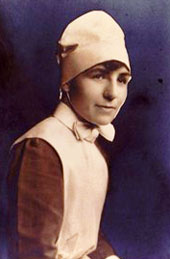 Nurse Una Brinsmead
Nurse Una Brinsmead
Una Pines (pictured to the left) became a nurse. At one time, a correspondent offered us her nurse's uniform, found in a charity shop in England. Una remained single and died in Wembley in 1995. Her brother Max lived with her after he returned to England following his wife's death.
Denis married Edna Fearn in 1931, but they were divorced. He then married Joan Ida Robinson in 1944. Joan was the daughter of the famous English Cartoonist and Illustrator, William Heath Robinson. Denis died in 1995.
